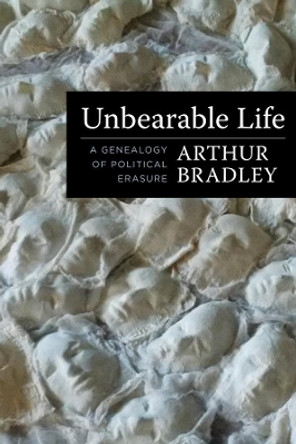Description
Arthur Bradley explores the power to render life unlived from ancient Rome through the War on Terror. He argues that sovereignty is the power to decide what counts as being alive and what does not: to make life "unbearable," unrecognized as having lived or died. In readings of Augustine, Shakespeare, Hobbes, Robespierre, Schmitt, and Benjamin, Bradley asks: What is the "life" of this unbearable life? How does it change and endure across sovereign time and space, from empires to republics, from kings to presidents? To what extent can it be resisted or lived otherwise? A profoundly interdisciplinary and ambitious work, Unbearable Life rethinks sovereignty, biopolitics, and political theology to find the radical potential of a life that neither lives or dies.
About the Author
Arthur Bradley is professor of comparative literature at Lancaster University. His books include Originary Technicity: The Theory of Technology from Marx to Derrida (2011).
Reviews
A momentous work of political theory. -- Niall Gildea * Textual Practice *
Bradley's book offers a highly original and distinctively new concept of life . . . [a] ground-breaking study. -- Bostjan Nedoh * Political Theology *
[A] compelling book . . . Bradley offers a very insightful perspective, combining authors from the field of political theology with theorists of biopolitics, such as Foucault, Judith Butler, and Giorgio Agamben. The result is a new, very distinctive interpretation of annihilating politics, past and present. -- Gerald Schwedler Christian-Albrechts-Universitat zu Kiel, Germany * The Review of Politics *
In this book, Arthur Bradley identifies the antinomical point of crossing, hitherto obscure, between the paradigms of biopolitics and political theology in the sovereign prerogative of making life, or death, never happen. It is a conceptual passage of extreme interest that, by rethinking the performative role of negation, widens the boundaries of political ontology. The sources used-ancient, modern, and contemporary-place this work at the center of current philosophical and political debate. -- Roberto Esposito, author of Immunitas: The Protection and Negation of Life
Arthur Bradley poses here a dramatic and unsettling challenge: to think a new natality. Not a renaissance, but a powerful call for 'future political children' to be born, who would break the cycles of a sovereign power intent on erasing countless existences that, beyond annihilation, would simply never have been. By way of Augustine, Shakespeare, Hobbes, Schmitt, and others, Unbearable Life presents us with a generalized martyrology, reading with unceasing insights the remarkable figures of Cacus and of Jephthah's daughter, of Robespierre and the Zapatistas, in order to diagnose and combat a nihilopolitics that, older and stronger than we wish to admit, very much persists today. -- Gil Anidjar, author of Blood: A Critique of Christianity
There is no 'murderous consent' organized by the state more radical and absolute than the one that declares the very existence of an individual or a community to be intolerable. What sovereign power then organizes is that individual or community's confinement to a state of inexistence that culminates in its erasure. Because such consent takes us to the heart of the modern theological-political imaginary, it is important to write its genealogy. Revisiting anew the thought of Foucault, Augustine, Shakespeare, Hobbes, Schmitt, and Benjamin, this is what the decisive analyses of Unbearable Life propose: a plunge into the roots of the violence that the contemporary world does not stop imposing upon us with increasing urgency. -- Marc Crepon, author of Murderous Consent: On the Accommodation of Violent Death
Book Information
ISBN 9780231193382
Author Arthur Bradley
Format Hardback
Page Count 288
Imprint Columbia University Press
Publisher Columbia University Press




